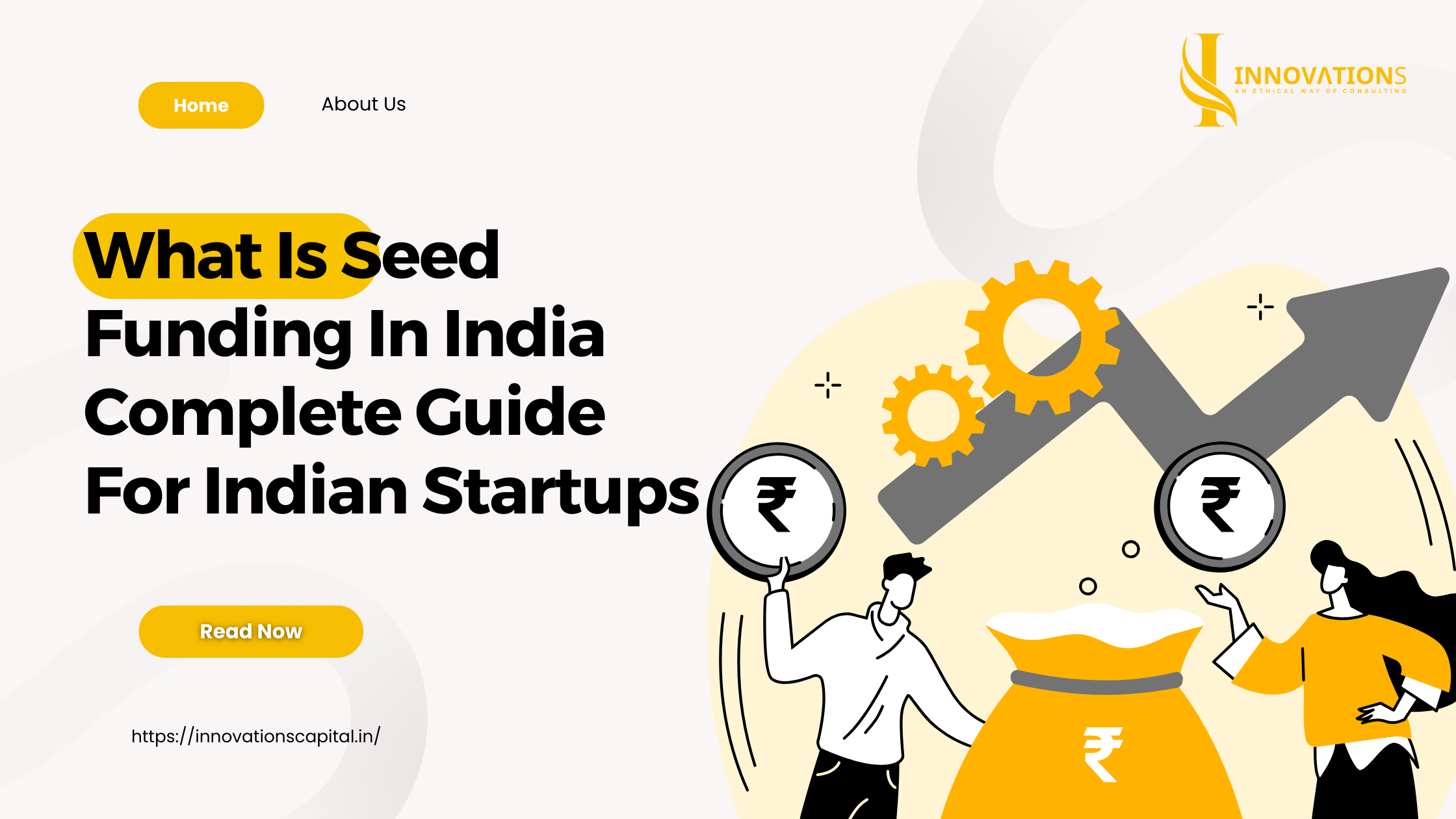Introduction:
Seed funding is the first investment an entrepreneur secures. It allows them to turn their idea into a viable business. In India’s rapidly growing startup ecosystem, seed funding plays a pivotal role in nurturing and propelling early-stage companies towards success.
The entrepreneurial spirit is soaring. The demand for seed funding has surged. It provides the money startups need to develop their products or services, start operations, and validate their business models.
The significance of seed funding in India’s entrepreneurial landscape cannot be overstated. It serves as a catalyst for innovation, enabling entrepreneurs to turn their dreams into reality and contribute to the nation’s economic growth. Recognizing this, Innovations capital has become a trusted partner for startups. They seek seed funding and guidance. Innovations Venture Studio understands the special challenges of early-stage companies. It offers a full set of services to support their growth.
This guide aims to help Indian startups. It covers seed funding’s importance, sources, and the process of getting seed investments. By explaining seed funding, startups can set themselves up for success. They can then navigate the start of their journey with confidence. They will have the knowledge and strategies needed to attract seed investors in india and move their ventures forward.
What is Seed Funding?

Seed funding is the first capital that entrepreneurs get. They use it to turn their ideas into viable businesses. It helps startups in their earliest stage. This stage is often called the “seed stage” or “pre-revenue stage.”
At the seed stage, a startup typically has a promising concept. It also has a founding team and a basic prototype or MVP. However, it lacks the needed resources and funding. It cannot fully develop, sell, and scale its product or service. Seed funding provides the money to start operations. It also validates the business model.
In India, seed funding amounts vary a lot. The range depends on factors. These include the startup’s industry, its growth potential, and the investors’ risk appetite. Generally, seed funding rounds in India range from INR 10 lakhs (approximately $12,500) to INR 2 crores (approximately $250,000). However, some exceptional startups have highly disruptive ideas or a strong founding team. They may get seed investments over INR 2 crores.
Seed funding enables startups to undertake crucial activities during this early stage, including:
- Funding allows startups to refine their products based on customer feedback and market demands.
- Seed capital supports making an MVP. An MVP is a basic version of the product. It is used to test the market and gather insights.
- Funding helps with market research. This includes customer surveys and competitive analysis. They check if the startup’s concept is good and improve its business model.
- Seed funding enables startups to attract and hire talented individuals. These people join the core team, which is key for growth and executing the business plan.
- Funding supports setting up basic operations. This includes office space, equipment, and tech.
- Seed capital allows startups to explore their target markets and find early customers. It lets them engage with those markets, get customers, and gather feedback for product improvement.
Investing in seed funding is high-risk. This is due to the uncertainties of early-stage startups. However, for investors willing to take this risk, seed funding offers a chance to get in early on promising ventures. These ventures have the potential for big returns if the startup succeeds in its vision and scaling.
Different Sources of Seed Funding For Startup in India

- Angel Investors
Angel investors are rich individuals. They invest their own money into early-stage startups in exchange for equity. In India, angel investors have become increasingly active in supporting promising entrepreneurial ventures. Many successful entrepreneurs and business leaders have turned to angel investing. They provide capital, as well as mentorship and industry connections, to startups.
- Venture Capitalists (VCs)
Venture capital firms are pro investment firms. They pool capital from many sources, like institutional investors, corporations, and rich individuals. They invest in high-growth startups. VCs are known for their involvement in later funding rounds (Series A, B, etc.). But, some VC firms also fund seed rounds. They do this often. They do it especially for startups with great growth prospects and strong founding teams.
- Incubators and Accelerators
They play a vital role in nurturing and supporting early-stage startups. They often provide seed funding, along with mentorship, workspace, and other resources. These programs are for startups. They help them validate their ideas, refine their business models, and prepare for future growth and funding rounds. Many top incubators and accelerators in India offer seed funding. This includes Startup Village, Axilor Ventures, and Nexus Venture Partners.
- Government Initiatives like the Startup India Seed Fund Scheme
The Indian government has seen the need to foster entrepreneurship and innovation. This has led to the launch of many initiatives to support startups, including programs to fund them. A notable example is the Startup India Seed Fund Scheme. It aims to help early-stage startups with a corpus of INR 945 crores. This scheme enables startups to access seed funding ranging from INR 20 lakhs to INR 2 crores, depending on their stage and requirements.
- Bootstrapping and Venture Capital Funding
While seed funding is crucial for early-stage startups, it is important to compare it with other funding options:
Bootstrapping means self-funding the startup. This uses personal savings, credit cards, or funds from family and friends. Bootstrapping lets entrepreneurs keep control and ownership. But, it may limit the startup’s growth due to limited resources.
Venture Capital Funding: After the seed stage, startups may seek venture capital from VC firms. They do this in subsequent rounds, such as Series A, B, C, and beyond. Venture capital investments involve more capital for a bigger equity stake. They also come with stricter terms than seed funding.
Each funding option has pros and cons. Startups should carefully evaluate their goals, growth plans, and willingness to dilute ownership. They should do this when deciding which path to pursue. Seed funding is pivotal. It bridges the gap between bootstrapping and larger venture capital. It gives startups the resources to validate their ideas. It helps them position for future growth and success.
The Seed Funding Landscape in India
The Seed Funding Landscape in India has grown in recent years. This growth is due to the country’s entrepreneurial spirit. People are increasingly recognizing the potential of startups. The landscape is changing and diverse. It has many investors and initiatives.
They support early-stage startups in many sectors and industries. Angel investors, such as Indian Angel Network, Mumbai Angels, and Ahmedabad Angel Network, play a key role. They help with seed investments and the growth of the angel investing community.
Venture capital firms, like Sequoia Capital, Accel Partners, and Blume Ventures, have created seed funds. They also invest in seed rounds for exceptional startups with high growth potential.
They have also become big players in the Indian seed funding ecosystem. They provide startups with seed capital, mentorship, workspace, and access to a network of experts and potential investors. Programs like Startup Village, Axilor Ventures, and Nexus Venture Partners have played a key role. They have nurtured and supported early-stage startups.
The Indian government has launched many initiatives and schemes to support startups. These include seed funding programs. The Startup India Seed Fund Scheme launched in 2021. It aims to give money to early-stage startups. It has INR 945 crores. This money will let startups get seed funding from INR 20 lakhs to INR 2 crores.
Tech and digital sectors have led in seed funding. The most popular sectors are e-commerce, fintech, edtech, healthtech, and business solutions. As the ecosystem matures and more success stories emerge, the seed funding environment in India is poised to become even more robust, nurturing innovative ideas and fostering the growth of the next generation of successful startups.
How Seed Funding Benefits Indian Startups
Seed funding is a crucial step for Indian startups, providing them with the resources and support to turn their innovative ideas into reality. It allows startups to validate their business idea by creating a minimum viable product (MVP) and testing it with real customers, reducing the risk of launching a product or service that fails to resonate with the target audience. Seed funding also allows startups to invest in market research, including competitor analysis and customer validation, to better understand their target market and identify pain points.
Seed funding also helps startups build a strong team, attracting and retaining top talent. It covers initial marketing and operational costs, such as setting up an office, acquiring necessary equipment, and launching marketing campaigns. Seed investors in India offer valuable mentorship and guidance, providing industry insights, strategic advice, and access to networks.
The concept of “proof of concept” (POC) is closely tied to seed funding, as it provides initial evidence that a startup’s idea or solution can successfully implement and address a real market need. A compelling POC can take various forms, increasing startups’ credibility and mitigating the perceived risk associated with investing in an unproven idea.
What is the Seed Funding Process in India?

Securing seed funding for startups in India is a multi-step process that requires careful preparation, effective communication, and a deep understanding of the Indian seed funding landscape. Here’s a breakdown of the seed funding process, along with practical tips for each stage:
Preparation:
(A):- Refining your business plan and financial projections:
- Develop a comprehensive business plan that clearly articulates your idea, target market, competitive landscape, and growth strategies.
- Prepare realistic financial projections, including revenue forecasts, cost estimates, and funding requirements.
- Conduct thorough market research and validation to support your assumptions and projections.
(B):- Identifying your target investors and their investment criteria:
- Research potential seed investors, such as angel investors, venture capitalists, and accelerator programs, that align with your industry and funding needs.
- Understand each investor’s investment criteria, preferred sectors, ticket sizes, and portfolio fit.
- Leverage your network and seek warm introductions to investors whenever possible.
- Practical Tip: Tailor your pitch and materials to address the specific concerns and interests of each potential investor.
Pitching:
(A):- Crafting a compelling pitch deck:
- Create a concise and visually appealing pitch deck that highlights your idea, market opportunity, team, traction (if any), and financial projections.
- Emphasize the unique value proposition and competitive advantages of your startup.
- Clearly outline your funding requirements and how the investment will be utilized.
(B): Pitching to potential investors and answering their questions effectively:
- Practice your pitch delivery to ensure confidence and clarity.
- Be prepared to answer tough questions about your business model, competition, and growth plans.
- Demonstrate a deep understanding of your industry and the problem you’re solving.
- Listen actively to investor feedback and be open to pivoting or refining your approach.
- Practical Tip: Seek feedback from experienced entrepreneurs or mentors to refine your pitch and anticipate potential investor questions.
Due Diligence and Negotiation:
(A):- Understanding the investor’s due diligence process:
- Be prepared to provide detailed information about your team, financials, intellectual property, and legal structure.
- Respond promptly and transparently to any requests for additional information or clarification.
- Demonstrate a commitment to good corporate governance and compliance practices.
(B):- Negotiating key terms of the investment deal:
- Understand the typical terms and conditions of seed funding deals in India, including equity stake, valuation, and investor rights.
- Negotiate from an informed position, balancing the need for capital with the long-term interests of your startup.
- Consider seeking legal advice to ensure a fair and favorable deal structure.
- Practical Tip: Maintain open communication with investors throughout the negotiation process, and be prepared to walk away if the terms are not aligned with your goals and vision.
Throughout the seed funding process, it’s crucial to be well-prepared, professional, and adaptable. Startups can increase their chances of securing the seed funding they need. They can do this by understanding the Indian seed funding landscape, crafting a compelling pitch, and navigating due diligence and negotiation well. This funding will let them turn their innovative ideas into successful businesses.
Challenges and Considerations for Seed Funding in India
Seed funding is a crucial aspect of early-stage startups in India, but it presents significant challenges. The country’s growing entrepreneurship has led to a surge in startups seeking seed funding, necessitating startups to stand out with innovative ideas, strong teams, and compelling business models. To attract investors, startups must present well-researched and executed business plans that demonstrate their unique value.
Indian seed investors have strict criteria for evaluating potential investments, including the startup’s idea, the founding team’s experience, market potential, and the ability to generate sustainable revenue. Startups must prepare to meet these high standards and present a well-researched business plan.
The Indian government has taken steps to support startups, but there is a need for stronger rules and policies to make the seed funding process smoother. Startup founders often face challenges related to complex laws and rules regarding taxes and intellectual property. Addressing these issues through clear and supportive regulations can facilitate a more conducive environment for seed funding activities.
Startups may not fit traditional seed funding criteria or face challenges in securing it, so they must explore alternative options such as bootstrapping, crowdfunding, government grants, and accelerator programs. Perseverance, adaptability, and a commitment to improvement are key to overcoming these challenges and securing seed funding for their ventures.
The Future of Seed Funding in India
Indian seed funding is changing. This is due to new trends, emerging tech, and shifting investor preferences. New funding options, like crowdfunding and revenue-based financing, are gaining traction in India. They are for startups seeking seed capital.
Investors are becoming more strategic in their seed funding choices. They focus on specific sectors, like deep tech and social impact. Startups in areas like artificial intelligence, machine learning, blockchain, and quantum computing are attracting interest from seed investors.
Technology is playing a pivotal role in streamlining and enhancing the seed funding process in India. Advancements in data analytics, artificial intelligence, and digital platforms are transforming the way startups connect with investors and pitch their ideas. Seed investors rely more on data.
Seed funding in India has a promising future. It will foster innovation, drive economic growth, and nurture the next generation of successful startups.
Conclusion:-
Getting seed funding is a key step for Indian startups. It gives the resources and support needed to turn ideas into successful businesses. As outlined in this comprehensive guide, the seed funding landscape in India is dynamic, competitive, and evolving.
Startups seeking to navigate this landscape have clear key takeaways. They need a strong strategy, a good pitch, and a strong support system to succeed. Startups must understand well the investment criteria of potential seed investors. They must craft a compelling story that shows their unique value. And they must be ready to navigate due diligence and negotiation well.
Startups must stay adaptable. They should be open to alternative funding like crowdfunding and revenue-based financing. This is essential, especially if they struggle to get traditional seed funding. Startups can raise more capital by diversifying their funding sources. They can also use new technologies to do this.
Throughout this journey, a trusted partner like Innovations Venture Studio can be invaluable. Innovations Venture Studio understands the unique challenges faced by early-stage startups. They offer a wide range of services to support their growth, and Manish Khurana’s expertise can help startups with many things. These include refining business plans and financial projections, finding investors, and navigating due diligence. They can help startups navigate the complexities of seed funding with confidence.
Securing seed funding is not about getting capital. It’s about validating your business idea and building a strong foundation. It’s also about positioning your startup for long-term success. By using a clear strategy and seeking advice from experienced partners, Indian startups can improve their chances. They can get seed investments and turn their ideas into thriving businesses. These businesses will contribute to the country’s vibrant entrepreneurial ecosystem.

